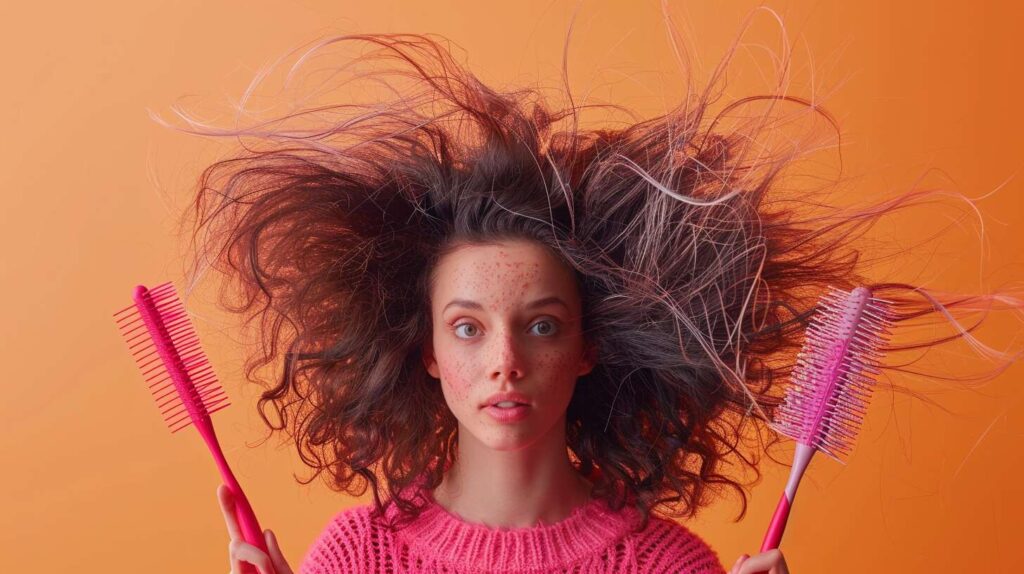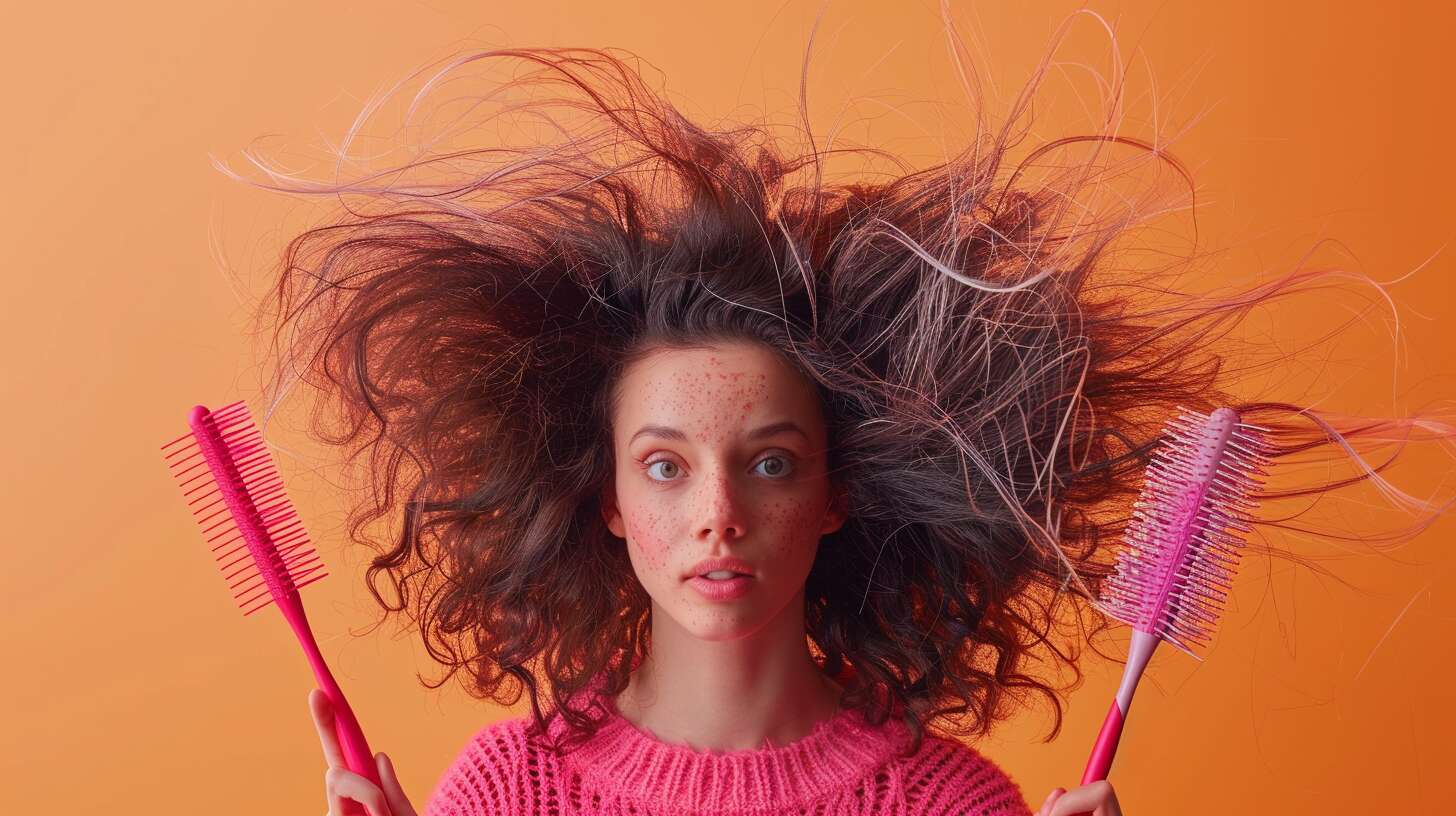
Taming Static: A Comprehensive Guide to Anti-Static Hair Solutions
Static electricity in hair, often referred to as antistatique cheveux in French, is a common annoyance, especially during dry winter months. It occurs when there’s an imbalance of electric charges on the surface of the hair, causing strands to repel each other and cling to clothing. Understanding the causes and implementing effective solutions is key to achieving smooth, manageable hair. This comprehensive guide explores the science behind static hair, preventative measures, and treatment options to help you bid farewell to flyaways and embrace healthy, static-free locks.
Understanding the Science of Static Hair
Static electricity arises from the triboelectric effect, where friction between two materials causes electrons to transfer from one surface to another. In the case of hair, friction with hats, scarves, or even hairbrushes can lead to an electron imbalance. Dry air exacerbates this issue, as moisture acts as a conductor, dissipating the charge. When the air lacks humidity, the charge builds up, resulting in the dreaded static cling. This is why you’ll often experience antistatique cheveux problems more frequently in winter.
Factors Contributing to Static Hair
- Dry Air: Low humidity levels promote static buildup.
- Synthetic Materials: Hats, scarves, and clothing made from synthetic fabrics like polyester and nylon are more likely to generate static.
- Hair Type: Fine and dry hair is more prone to static than thick, oily hair.
- Harsh Shampoos: Shampoos containing sulfates can strip the hair of its natural oils, making it drier and more susceptible to static.
- Over-washing: Frequent washing can also deplete the hair’s natural moisture.
Preventative Measures for Combating Static Hair
Prevention is always better than cure. Implementing these preventative measures can significantly reduce the occurrence of antistatique cheveux:
Hydrate Your Hair
Keeping your hair adequately hydrated is crucial in preventing static. Dry hair is more prone to static, so moisturizing regularly is essential.
- Use a Hydrating Shampoo and Conditioner: Opt for sulfate-free shampoos and moisturizing conditioners that replenish the hair’s moisture.
- Deep Condition Regularly: Apply a deep conditioning mask once or twice a week to provide intense hydration. Look for ingredients like shea butter, coconut oil, and argan oil.
- Leave-In Conditioner: A leave-in conditioner can provide continuous hydration throughout the day.
Choose the Right Hair Products
The products you use can significantly impact your hair’s static levels. Avoid products that contain alcohol, which can dry out your hair. Instead, look for products designed to add moisture and control frizz. Many people search for “antistatique cheveux products” online to combat this issue.
- Anti-Static Sprays: These sprays contain ingredients that neutralize static charges.
- Hair Oils: Lightweight hair oils like argan oil or jojoba oil can add shine and reduce static.
- Serum: A hair serum can smooth the hair cuticle and prevent flyaways.
Adjust Your Hair Care Routine
Small changes to your hair care routine can make a big difference in preventing antistatique cheveux.
- Reduce Washing Frequency: Over-washing strips the hair of its natural oils. Try washing your hair every other day or less frequently.
- Use a Cool Water Rinse: Rinsing your hair with cool water after conditioning helps to seal the cuticle and lock in moisture.
- Air Dry When Possible: Heat styling can dry out the hair and make it more prone to static. Air dry your hair whenever possible.
Optimize Your Environment
The environment plays a significant role in static buildup. Increasing humidity and using the right materials can help.
- Use a Humidifier: A humidifier adds moisture to the air, reducing static electricity.
- Choose Natural Fabrics: Opt for natural fabrics like cotton and silk over synthetic materials.
- Static Cling Sprays for Clothing: These sprays reduce static cling in clothing, preventing your hair from sticking to your clothes.
Treatment Options for Existing Static Hair
Even with preventative measures, static hair can still occur. Here are some effective treatment options to combat existing antistatique cheveux:
Quick Fixes for Static Hair
- Water: Lightly dampen your hands with water and smooth them over your hair to neutralize static.
- Lotion: A small amount of hand lotion can be applied to your hair to reduce static. Be careful not to use too much, as it can make your hair greasy.
- Dryer Sheets: Gently run a dryer sheet over your hair to eliminate static.
- Metal Comb: Using a metal comb can help to dissipate static charges.
Long-Term Solutions for Static Hair
- Hair Masks: Regularly use hair masks to provide deep hydration and repair damaged hair.
- Oil Treatments: Apply hair oils like coconut oil or argan oil to the ends of your hair to add moisture and shine.
- Professional Treatments: Consider professional treatments like keratin treatments or Brazilian blowouts to smooth the hair and reduce static.
Specific Hair Types and Static
Different hair types react differently to static. Understanding your hair type is crucial for finding the right solutions for antistatique cheveux.
Fine Hair
Fine hair is particularly prone to static because it lacks the weight to resist flyaways. Use lightweight products that won’t weigh down your hair. Look for volumizing shampoos and conditioners that also provide moisture.
Thick Hair
Thick hair can also experience static, especially if it’s dry. Use heavier moisturizers and oils to keep your hair hydrated. Deep conditioning treatments are essential for maintaining moisture.
Curly Hair
Curly hair is naturally drier than straight hair, making it more susceptible to static. Use curl-defining creams and oils to hydrate and define your curls. Avoid products that contain alcohol, as they can dry out your hair.
Damaged Hair
Damaged hair is more porous and prone to static. Repair damaged hair with protein treatments and moisturizing masks. Avoid heat styling and harsh chemicals.
Ingredients to Look For in Anti-Static Hair Products
When shopping for antistatique cheveux products, look for ingredients that add moisture, smooth the cuticle, and neutralize static charges.
- Glycerin: A humectant that attracts moisture from the air to the hair.
- Shea Butter: A rich emollient that moisturizes and softens the hair.
- Argan Oil: A lightweight oil that adds shine and reduces frizz.
- Coconut Oil: A moisturizing oil that penetrates the hair shaft.
- Silicones: Smooth the hair cuticle and reduce static (use sparingly to avoid buildup).
- Panthenol (Vitamin B5): A humectant that moisturizes and strengthens the hair.
Debunking Common Myths About Static Hair
There are many misconceptions about static hair. Let’s debunk some common myths about antistatique cheveux:
- Myth: Static hair is caused by dry hair alone. While dryness is a major factor, static is also influenced by friction, materials, and environmental conditions.
- Myth: All hair products are created equal. The ingredients in hair products can significantly impact static levels. Choose products specifically designed to add moisture and reduce frizz.
- Myth: You can only prevent static hair in the winter. Static can occur year-round, especially in dry climates.
Conclusion: Embrace Smooth, Static-Free Hair
Dealing with antistatique cheveux can be frustrating, but with the right knowledge and strategies, you can achieve smooth, manageable hair. By understanding the science behind static, implementing preventative measures, and using effective treatment options, you can say goodbye to flyaways and hello to healthy, static-free locks. Remember to hydrate your hair, choose the right products, and optimize your environment to minimize static buildup. Whether you have fine, thick, curly, or damaged hair, there are solutions available to help you tame static and embrace beautiful, static-free hair. [See also: Best Hair Serums for Frizzy Hair] [See also: How to Choose the Right Shampoo for Your Hair Type]

